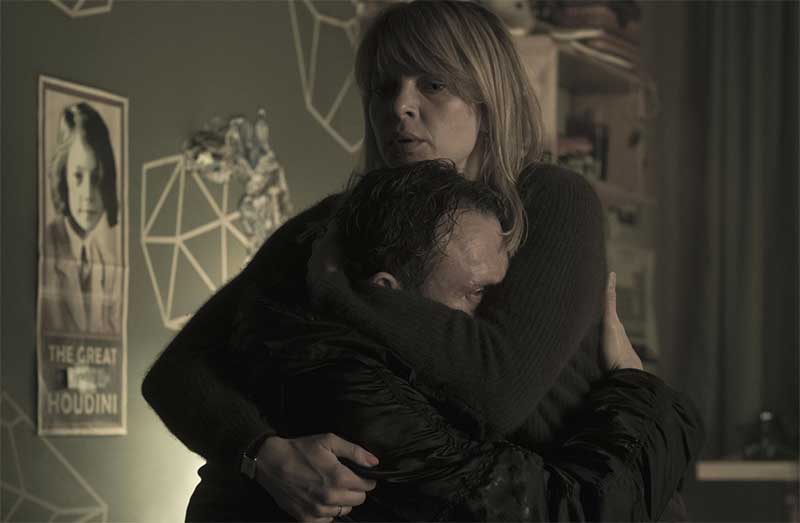Dark is a German mystery series with a bit of supernatural, time-travel, not who or what but when magic thrown into the excitement. It’s the first German series Netflix has produced.
Dark is a good name for this dark, rain-drenched mystery. The music is moody and scary, caves and a nuclear power plant brood over the forest. It’s 2019. The mysterious happenings in a small German town called Winden are exactly like something that happened there 33 years before.

We open with Jonas Kahnwald (Louis Hofmann) having a nightmare about his father hanging himself. He goes downstairs to discover the power is out. Power outages are a recurring theme in the series, with big events accompanied by flashing lights and power surges. Jonas calls up to his mother Hannah (Maja Schöne) that the power is out. She’s having sex with Ulrich Nielsen (Oliver Masucci). He gets up from her bed, sneaks out the balcony door, and goes home to his family.
As Jonas rides his bike to school, we see signs and posters about his missing friend Erik (Paul Radom). Erik’s disappearance sets off alarm bells among certain citizens of the town, because a similar disappearance occurred 33 years ago on the same date.
At home Ulrich’s family is having breakfast. His wife Katharina (Jördis Triebel) turns out to be the school principal. His youngest son Mikkel (Daan Lennard Liebrenz) fancies himself a magician like Houdini.

Ulrich is a cop. He’s investigating Erik’s disappearance. The viewers know Erik isn’t dead, at least not yet, because we see him held captive and tortured. Over a week after Erik goes missing, Ulrich’s son Mikkel goes missing, too. Thirty-three years ago, Ulrich’s brother disappeared at the same time as Mikkel.
The police discover a dead boy, Mikkel’s age. He’s dressed in 1980s clothing and carrying a 1980s cassette player. He has a 1986 coin on a chain around his neck. He’s been tortured. But he isn’t Mikkel. They cannot figure out who he is.

Working with Ulrich is the cop Charlotte Doppler (Karoline Eichhorn). She notices similarities between the disappearances from the past. And other events. Birds fall from the sky, their eardrums burst. Sheep (33 sheep) drop dead in the fields, their ear drums burst. The unidentified boy’s eardrums are burst.
Later we see Mikkel walk out of the Winden Caves. He goes to his house, which is surrounded by things he doesn’t recognize. His key doesn’t work. A teenaged Ulrich answers the door and doesn’t recognize Mikkel. Mikkel looks at the newspaper and sees that it’s 1986. Ulrich goes off to school with a teenage Katharina. How can you tell your parents that you’re going to be their son in 33 years? Mikkel doesn’t.
The Stranger (Andreas Pietschmann) walks out of the Winden Caves carrying a suitcase. He’s filthy. He rents a room in the hotel and pins information about the past disappearances and the current disappearances all over his walls. He knows Mikkel has gone to another time. He appears to various people in the woods.
And with that much introduction, the story is off and running. We wander back and forth between 1986 and 2019, and other 33 years apart looks into the past and future. The caves, the power plant, the people as their present and past selves – everything is examined.
The relationship between people and families in the town of Winden is explored over the years from 1953, 1986 and 2019. The series is as much relationship drama as it is science fiction with family secrets and lies a recurring theme.

The Stranger seems to move easily between time periods and interact with the characters whenever they are. There’s a mysterious clock maker H.G. Tannhaus (Christian Steyer) with a golden clock-like device who might be able to control the space time continuum.

Deep philosophical musings about endings and beginnings, eternal recurrence, and 33 year cycles involving the alignment of the earth, moon and stars permeate the story. Many episodes contain these long philosophical/scientific discourses. There are detailed symbols everywhere such as labyrinths, clocks, and never ending cycles of dates and times for mystery lovers to dig into. Portals with ancient symbols turn out to be passages through time. The idea that everything is interconnected is repeated many times.
I thought the plot to take unsolvable mysteries about missing boys and wrap them up in an inter dimensional exploration of space and time was interesting and different. As with any effective series, each episode provided new insights and new revelations. Jonas was a key figure in every episode. He was determined to change things back to “normal” no matter what year he was in and did things to interfere with events and undo the manipulations of time that the evil characters were doing.
The creators did their best to help you keep track of characters in different times with different actors playing different ages. One character had a damaged ear, one had a prominent mole, one had very curly hair, was one tall and blonde. These cues helped viewers anchor themselves with who the character was.
Much of the story took place in the dark, in the cave, in a basement room, in pouring rain. The few scenes outside in the daylight were muted and wintry. This series is dark in every way, exploring the darkness of the human heart most of all.
The final episode of season 1 feels as if they already knew they had a season 2 promised by Netflix. It opened up many questions and left us hanging on several important plot points. If you liked this suspense-filled German series, a second season is in the works.
All 10 episodes of Dark were directed by Baran bo Odar, who also created the series.
I’d love to hear your thoughts on Dark in the comments.

Leave a Reply